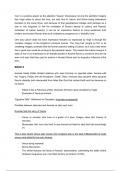river in a positive aspect as the adjective “beauty” showcases not only the aesthetic imagery
that Virgil refers to about the river, but also due to Latium and Rome being civilisations
founded on the same River, and because of that geographical linkage (and perhaps as a
way to link Augustus to link his civilisation of Rome’s beauty to Latinus and Aeneas’
civilisation of Latium beauty), it can be an impressive feature to many audiences both
modern and Ancient Roman that such civilisations prospered on a “beautiful river”.
One way Latium does not have impressive features as expressed by Virgil is through the
macabre imagery of the kingdom’s princess Lavinia. “Her long hair caught on fire” is an
unsettling imagery contrasts with the former peaceful setting of Latium, as it was a bad omen
that a great war would be arriving to the peaceful Latium. This means that Latium being at a
state of war is not impressive to an hopeful pacifist in Ancient Rome or someone who did not
want civil wars that they used to endure in Ancient Rome prior to Augustus’ influence at the
time.
BOOK 8
Aeneas meets Pallas (distant relatives who were formerly on opposite sides: Aeneas with
the Trojans, Pallas with the Arcadians- Greek Tribe). However they became allies because
they’re distantly both descended from Atlas (the God that carries Earth and the Heavens on
his back).
- Pallas is like a Patroclus written character (Homeric style emulated by Virgil)
- Examples of Xenia prominent.
“Egyptian Wife”- Reference to Cleopatra, Augustan propaganda
Parallels between Hercules and Aeneas vs Hera and Juno.
Evander tells the story of Cacus
- Cacus (a monster who lives in a grotto of a cave. Dragon vibes idk). Enemy of
hercules.
- Showcases that Juno has tried to stop heroes but failed to stop their fate accordingly
(?)
This is also where Venus asks Vulcan (her husband who is the God of Blacksmith) to make
armour and shield for her son Aeneas.
- Venus being maternal
- Divine intervention
- The shield features the faces of Aeneas’ descendants, culminating the battle where
Octavian (Augustus) won over Mark Antony act Actium (31 BC)




